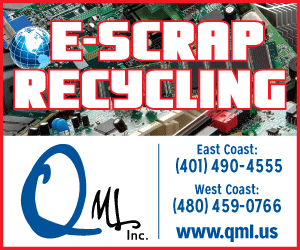 Brands can’t use patent law to block the resale of their products, the U.S. Supreme Court ruled, a decision that has implications for the electronics reuse industry.
Brands can’t use patent law to block the resale of their products, the U.S. Supreme Court ruled, a decision that has implications for the electronics reuse industry.
An electronics repair advocate hailed the May 30 decision.
“This cements your ability to resell or repurpose products without being beholden to the original patent holder,” said Kyle Wiens, CEO of iFixit, in an interview. “There was a lot at stake here.”
The case was Impression Products vs. Lexmark International. It centered on whether Lexmark has a right under U.S. patent law to prevent Impression, a West Virginia-based remanufacturer, from purchasing empty, second-hand Lexmark printer cartridges, refilling and reselling them.
Authored by Chief Justice John Roberts, the majority decision found in favor of Impression, overturning an appeals court ruling.
“When a patentee sells one of its products … the patentee can no longer control that item through the patent laws – its patent rights are said to ‘exhaust,'” according to the May 30 decision. “The purchaser and all subsequent owners are free to use or resell the product just like any other item of personal property, without fear of an infringement lawsuit.”
Seven justices signed onto the opinion, with Associate Justice Ruth Bader Ginsburg filing an opinion concurring in part and dissenting in part.
Immediately after the decision was released, Wiens tweeted that the decision has a lot of ramifications, noting that it “removes a cloud from a host of industries – from auto recycling to phone repair.” Then, in characteristic fashion, he added some humor: “And of course, it should help make print cartridges cheaper. For those of you who still print out your Supreme Court decisions.”
‘Smooth flow of commerce’
An expert told The New York Times the decision means that anyone who refurbishes, repairs and resells used products would now be protected from patent infringement claims. In his decision, Roberts used the example of a shop that restores and sells used cars.
“The business works because the shop can rest assured that, so long as those bringing in the cars own them, the shop is free to repair and resell those vehicles,” Roberts wrote. “That smooth flow of commerce would sputter if companies that make the thousands of parts that go into a vehicle could keep their patent rights after the first sale. Those companies might, for instance, restrict resale rights and sue the shop owner for patent infringement.”
The case also touches on consumer electronics, with manufacturers including Intel, Dell and Vizio filing an amici curiae brief in favor of Impression’s position. The brief noted the multitude of patented parts used in their products. A generic smartphone, for example, could rely on 250,000 patents.
One group, the Patent Reform Project at Washington, D.C.-based group Public Knowledge, cheered the decision. The nonprofit advocacy group in January joined with the Electronic Frontier Foundation (EFF) and others in filing an amici curiae brief with the court.
The brief argued for a strong “exhaustion doctrine,” saying a weak one allows manufacturers to seek to monopolize repair and secondary resale markets. The lower court’s decision jeopardized independent refurbishers and repair services, the brief claimed.
Technology companies weighing in with briefs in favor of Lexmark included Dolby Laboratories, HTC, Interdigital, Nokia, Plantronics and Qualcomm, among others. IBM argued in favor of Lexmark’s position when it came to patent rights in internationally traded goods. In its brief, Qualcomm argued assertions that repair markets would be destroyed if the court upheld the appeals court ruling were unjustified.
“Car sellers are not using patent rights to prohibit second-hand sales or third party repairs,” according to the filing. “Consumers are not being ambushed by patent assertions from manufacturers or licensors upstream in the chain of commerce.”
Impression and others in support of it “give no single real-world example of such an occurrence,” Qualcomm’s attorneys wrote.
Impediments to repair remain
While hailing the court’s decision, Charles Duan, director of the Patent Reform Project, noted that patent law isn’t the only tool companies use to restrict usage and resale of their products.
“Copyright law, trademark law, clever contracts and end-user license agreements continue to burden consumers with restrictions that are often unbalanced and unfair,” Duan stated in the press release.
Kit Walsh, staff attorney at EFF, predicted the decision would help push back against “abusive terms of use and ‘end user license agreements’ that purport to strip you of your rights on pain of copyright infringement.”
“The next logical step will be for courts to recognize that people who buy digital goods are owners of those goods, not mere licensees, and can resell and tinker with their digital goods to the same extent as purchasers of tangible property,” Walsh wrote.
Wiens, who penned an op-ed for Wired explaining the significance of the decision, agreed the decision helps the repair industry fight against other impediments, but challenges remain. He used the example of the Barnes and Noble license agreements forbidding repairs of Nook tablets.
The “main battle to fight” is ensuring comprehensive ‘right to repair’ legislation is enacted around the country, Wiens told E-Scrap News. Those bills, which have been aggressively fought and defeated by original equipment manufacturers, ensure diagnostic and repair information and repair tools are made available to independent shops.
More stories about refurbishment/reuse
- Construction stops at Georgia solar panel recycling plant
- Corporate E-Waste Solutions expands into AZ, KS
- Texas passes right-to-repair for consumer electronics



